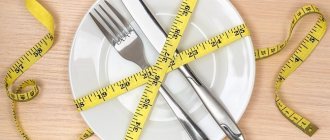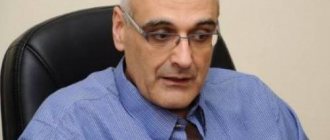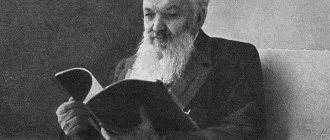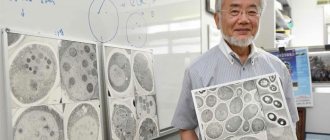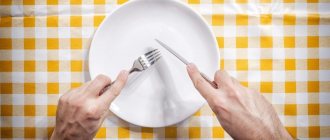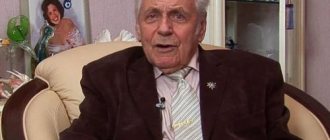Yuri Sergeevich Nikolaev (1905-1998) - famous psychiatrist, Doctor of Medical Sciences. He worked a lot on the issues of fasting-dietary therapy (RDT). Initially I used it for the treatment of serious mental disorders, then for general improvement of the body and weight loss. Few people know that his views on nutrition and lifestyle were influenced by L.N. Tolstoy himself, with whom Yuri Sergeevich’s father was friends and about whom there were constant conversations at home.
Yuri Sergeevich Nikolaev and the book “Fasting for Health,” which describes in detail his method of therapeutic fasting
Since 1981, on his initiative, an RDT department was created at one of the Moscow hospitals. From that moment until his death, Professor Nikolaev headed it and received patients there. He described his method in detail in the book “Fasting for Health.” The theoretical basis is presented in the collection “Therapeutic fasting. Clinical and experimental studies”, which was the result of many years of joint work of physiologists, psychotherapists, clinicians, pathophysiologists and biochemists.
The essence
Firstly, fasting according to Nikolaev is fasting on water. It is not dry, suggesting abstinence only from food. Secondly, its main purpose is to improve the health of the body, which is why it is called medicinal.
Yuri Sergeevich himself did not like the term “fasting”, so his system has a different name - fasting-dietary therapy. He always drew attention to the fact that his methodology is two closely interconnected parts and one cannot exist without the other. The first is directly abstaining from food. The second is the recovery period or exit. Without it, according to the professor, positive results cannot be achieved.
How does Nikolaev’s system differ from other similar ones:
- physical activity is recommended;
- there are indulgences (for example, honey during periods of crisis, rosehip infusion daily);
- carrying out medical procedures (special type massage, physiotherapy);
- supervision of a specialized specialist is required.
The system is not as strict as some other proprietary methods, so many people who want to try therapeutic fasting prefer it. According to the majority, throughout the course they are given strength by the idea that they can drink water at any time, rosehip infusion is allowed 4 times a day, and in case of a crisis, honey can be consumed.
Effect on the body
Yu. S. Nikolaev first studied the theory of therapeutic fasting for a long time, from antiquity to modern days. Then, together with a team of scientists, he conducted his own research to find out exactly what happens to a person when he abstains from food for a long time. He describes the results of his research in detail on the first pages of his book.
After food stops entering the body, it is forced to switch to internal nutrition, for which it uses accumulated reserves. In order to spend them, almost all organs and systems begin to work in enhanced mode.
Nikolaev proved that during fasting days, through the lungs, urine and intestines, relief occurs from:
- fat cells and harmful substances formed as a result of their breakdown;
- "dead" water;
- insoluble deposits in joints;
- excess salt deposits;
- toxins, toxic compounds.
Result:
- the supply of oxygen to cells improves, as the speed of blood flow increases;
- sclerotic plaques resolve;
- pathogenic microorganisms in the intestine die, its microflora is normalized, congestion in the abdominal cavity is eliminated;
- biochemical changes occur in the heart muscle, it strengthens - the risk of heart attacks and ischemia decreases;
- vision improves;
- in the process of autolysis, pathological, painful cells, congestive edema, and adhesions are disposed of;
- brain activity is activated;
- blood pressure stabilizes;
- impaired metabolism is restored.
On the 4th day of fasting, a person loses the desire to eat. Nikolaev explained this by the production of the neurohormone cholecystokinin, which suppresses appetite. But these are not all of its useful functions. Thanks to him, addiction to smoking, alcohol and drugs disappears. Moreover, after completing the treatment course, she never returns.
And, of course, there is a noticeable weight loss: about 18% of the original value.
Based on the effect that therapeutic fasting has on the body, Nikolaev called it an operation without a knife.
Stages of fasting
Dr. Nikolaev, during observations and research during the period of therapeutic fasting, identified 3 stages:
Food excitement.
The period of the first stage lasts no more than three days. At this time, patients react with irritation to any reminder of food: the smell, conversation about food, the sight, sound of dishes. The period of food excitement is accompanied by copious salivation, rumbling in the stomach, poor sleep, low mood, uneven pulse, and rapid weight loss (0.5-0.8 kg per day).
Read also: What drinks can you drink while fasting and in what quantity?
Increasing acidosis.
After 3-7 days, the feeling of hunger dulls or disappears completely, but thirst increases. In most cases, a inhibited state is observed. Side effects appear. Weight loss decreases (0.3-0.5 kg per day). After completion of the second stage, the behavior, condition and mood of patients changes sharply and radically. The third stage begins.
Adaptation or compensation.
After a few days, a turning point occurs, and the patients’ condition improves, their mood improves, negative symptoms disappear, weakness goes away, vigor appears, appearance improves, thinking becomes clearer, eyes light up, and heart rate normalizes. Body weight loss slows down, patients lose 0.1-0.2 kg per day. There is a disappearance of fear, anxiety, nervous excitement, tension, and signs of depression.
The length of adaptation time is individual for each person and ends with the appearance of a strong appetite. Sleep deteriorates and irritability may appear. The third stage of fasting enters the recovery period.
Preparatory stage
The professor insisted that before starting a fast, everyone should undergo a full medical examination. A therapist and a neurologist are among the first specialists you should visit. Tests of stool, urine, blood, as well as an electrocardiogram and electroencephalogram are required. We need data such as height, weight, age, constant pressure and pulse. Based on them, the doctor determines the duration of the course (from 2 weeks to 40 days).
Then a detailed consultation is carried out so that the person is mentally adjusted. Being a psychotherapist, Nikolaev paid special attention to this. He is briefly introduced to what will happen to the body, what requirements must be met, and the results are described in detail (a kind of incentive is given).
Physical preparation is minimal: after lunch, the intestines are cleansed with a saline solution. From the moment of its introduction, we can assume that fasting has begun: medication is stopped and abstinence from food begins.
A course of treatment
Therapeutic fasting according to Nikolaev is a whole complex of procedures for cleansing and healing the body. So don’t expect to be able to lie down and relax. This technique is one of the most active.
Daily regime
- Enema
The morning of each day begins with a cleansing enema.
- Bath (shower)
Mandatory in the morning of every day, since decay products formed in the body also come out through the pores. They need to be eliminated in a timely manner.
- Massage
At home, it is impossible, since a professional massage of a certain type is required - pressure. Imagine that someone is dancing on your back. Approximately the same sensations occur after this procedure. The main goal is to hyperemia the skin and crush the thoracic and cervical spine.
- "Breakfast"
Drink a glass of rosehip infusion. The recipe is simple: in the evening add 4 tbsp. l. dry fruits with 4 cups of boiling water in a thermos. Strain in the morning.
- Afternoon set of events
After breakfast, half an hour is allotted for passive rest. It is recommended to lie down and read. After this, a long walk is necessary. Moreover, it is imperative to dress as warmly as possible, because during fasting the body temperature decreases and a person quickly freezes. In the fresh air, Nikolaev prescribed breathing exercises for his patients. You can take water with you (the estimated daily intake is 1.5-2 liters, but it may vary depending on individual characteristics).
- "Dinner"
Another glass of rosehip infusion. If desired, it can be replaced with plain water or Borjomi.
- Afternoon activities
Another half hour rest. Individuals then ideally attend the physiotherapy treatments prescribed during the pre-screening. Usually this is UHF therapy (exposure to a high-frequency electromagnetic field), diathermy (warming with electric current), Charcot's shower, medicinal baths. This point will allow you to understand once again that Nikolaev’s method is intended primarily for inpatient treatment in a health center or sanatorium. At home, such a set of activities is not available.
Yu. S. Nikolaev in his method recommends long (20-30 km) walking, which distinguishes it from other proprietary fasting methods
In your free time from procedures, it is recommended to engage in occupational therapy (work with the soil, clean up), games (board and outdoor), and hobbies (drawing, embroidery, knitting). Walking in the fresh air is encouraged.
- "Dinner"
Drink another glass of rosehip infusion.
- Evening set of events
After dinner, Nikolaev advises all hungry people to do what gives them pleasure. It does not prohibit watching TV or actively communicating with each other. His treatment center hosted discos every evening after dinner.
- A set of activities before bedtime
Drink the last glass of rosehip infusion of the day. Water procedures are required: brushing teeth, gargling, and, if desired, a warm shower.
- Dream
Nikolaev paid great attention to the organization of sleep. The room in which the fasting person sleeps must be ventilated or well ventilated in advance. Be sure to have a warm blanket (again due to reduced body temperature). In recent weeks, the professor recommended going to bed with hot water bottles. If possible, change them during the night.
Stages
During fasting, the body has to overcome stages, which Nikolaev informs his patients in advance, so that they know which sensations at which stage arise within the normal range, and which ones should be immediately reported to the doctor and, possibly, the trial should be stopped.
Stage 1. Food excitement
Terms: 1-3 days.
Feel:
- excessive salivation;
- severe attacks of hunger, feeling of emptiness in the stomach;
- insomnia;
- lethargy, drowsiness, irritability and even aggression, bad mood;
- increased heart rate.
Weight loss: minus 1 kg per day.
Stage 2. Increasing acidosis
Terms: 3-5 days.
Feel:
- the feeling of hunger dulls or disappears, but thirst increases;
- slow reactions;
- in the morning migraine, nausea, weakness, it can be difficult to get out of bed;
- coating on the tongue, dry mucous membranes, acetone odor from the mouth;
- pale and dry skin throughout the body;
- hypotension;
- rare pulse;
- deep breathing.
Weight loss: minus 0.5 kg per day.
Stage 3. Compensation
Timing: from 6 days onwards.
Feel:
- improvement of well-being and mood;
- a surge of strength, energy, vigor;
- disappearance of plaque on the tongue;
- sparkle in the eyes;
- cleansing the skin of rashes and dryness;
- normalization of pulse and blood pressure;
- restoration of mental balance (bad thoughts, depression, anxiety go away).
Weight loss: minus 200 g per day.
The duration of this stage is different for everyone. The end is considered to be the time when a brutal appetite appears.
Therapeutic fasting system in Nikolaev
Nikolaev Yuri Sergeevich is known as an outstanding psychiatrist of the Soviet era and the author of literary works on the topic of fasting-dietary therapy. His book, written with other co-authors, is Fasting for Health.
There are more than ten systems and schemes of therapeutic fasting, among which the popular ones are:
- cascade,
- periodic,
- full water,
- absolute (divided into partial dry and complete dry),
- combined.
Fasting according to Nikolaev’s method involves abstaining from food for up to 3 weeks. He practiced the technique on himself and on patients with mental and psychosomatic disorders, and later on patients with various other diseases.
Long food breaks, carried out in conjunction with additional therapeutic and cleansing procedures, can produce internal cleansing from harmful substances, restore and resume the work of many internal organs and systems, and change a person’s consciousness, enlighten the mind, relieve obsessive thoughts, and free him from oppressive fantasies.
In the book, Dr. Nikolaev describes the case histories of people suffering for years from various diseases. On the advice of a doctor, patients underwent a course of therapeutic fasting for 21 days in the inpatient department of the clinic under the supervision of medical personnel. Yuri Sergeevich in all cases noted the onset of significant improvement already on the 5-7th day of diet therapy. Most of the patients with schizophrenia with whom the professor worked got rid of disturbing symptoms: auditory and visual hallucinations, fears, isolation, mania, delusions, and some were completely healed.
Find out in detail about the fasting-dietary technique of Dr. Nikolaev from his book Fasting for Health
The fasting system according to the Nikolaev method is characterized by 21-day abstinence from food, sometimes longer diets were used - 30-40 days. Food breaks were complemented by other important aspects in treatment:
- cleansing enemas,
- daily walks in the fresh air,
- physiotherapeutic and water procedures,
- massages,
- breathing exercises,
- drinking water and rosehip decoction.
Fasting and dietary therapy was carried out exclusively within the walls of the hospital under the supervision of specialists and only after a complete examination of the patient for contraindications. During the period of famine, the use of all medications was stopped.
Unloading the body according to Nikolaev’s method is divided into three stages:
- Entrance, which includes examination, psychological preparation and cleansing procedures.
- Time to give up solid food (you are allowed to drink water and rosehip decoction). During the food break, the patient was given daily enemas, a “pressure” back massage, baths, and taken for a walk, where the patients performed breathing exercises.
Read also: Principles of nutrition and treatment of constipation in a bedridden elderly patient
During the day, the patient drank 1.5-2 or more liters of liquid (water, Borjomi, decoction). Before going to bed, teeth were brushed and the mouth and throat were rinsed. The professor noted that oral hygiene plays an important role in the treatment of hunger. You need to sleep in a well-ventilated area. Every other day, physiotherapy procedures were carried out, which were selected individually for each case depending on the disease.
- Recovery or recovery from fasting. This phase of treatment is a particularly important period, the duration of which is equal to the duration of the fast.
We recommend reading
- Treatment of cancer with juices, the Breuss method
- Velvet fasting: Alfred Ziganshin's method
- Cleansing the body according to the method of Marva Ohanyan
Recovery period
Nutrition
After the end of fasting, you need to go through another stage of the treatment course - follow a diet. In his book, Nikolaev offers the following scheme for breaking out of 20-day abstinence:
The amount of food is designed for a person of average build, so it can either be increased for obese people or reduced for thin people. In this matter, it is advisable to consult with specialists.
The table can be adapted for a course of any length. For example, you need a way out of a 10-day fast, but this program is designed for 20 days. You just need to halve the number of rehabilitation days. That is, grated fruits can be eaten not on the 4th day, but already on the 3rd day, etc.
Special Notes on the Recovery Diet
- Recommended juices: apples, grapes or carrots. Drink in small sips, keep in your mouth for a long time, mix with your own saliva, enjoy the taste.
- On the first day of release, the juices should be diluted with water in equal proportions. They should be homemade, freshly squeezed, without adding spices.
- Recommended porridges are buckwheat, millet, rice, oatmeal. They should be as liquid as possible (as Nikolaev himself calls them, “smears”). They need to be chewed thoroughly and for a long time.
- If you are on a hunger strike in winter and you cannot get fresh fruits and vegetables, you can eat canned, frozen and dried ones. But you will have to chew them more thoroughly.
- Kefir can be replaced with any other fermented milk product.
Recipe
Nikolaev gives his own recipe for vinaigrette for the recovery stage.
Cut: 250 g of boiled new potatoes, 50 g of fresh white cabbage, 5 g of onions. The following are grated: 100 g of fresh carrots, 80 g of boiled young beets. Next, all this is mixed, seasoned with 15 ml of vegetable oil and 1 tsp. lemon juice. The resulting portion is divided into 2 parts and eaten at different meals.
Prohibited
- Salt;
- meat;
- eggs;
- mushrooms;
- alcohol, tea, coffee;
- everything fried;
- smoking.
And the most important thing! Throughout the recovery period, you should adhere to the same daily routine that was established during fasting. That is, enemas, baths, massages, physiotherapy and walks continue to be performed.
Stages of rehabilitation
During rehabilitation, the body goes through 3 more stages.
Stage 1. Asthenic
Terms: 1-3 days.
Feel:
- 100 ml of juice is enough to satisfy hunger, but after half an hour the ravenous appetite wakes up again;
- weakness;
- mood swings;
- diarrhea;
- rapid pulse;
- frequent, intermittent breathing.
Weight loss: minus 200 g per day.
Stage 2. Intensive recovery
Terms: 4-21 days.
Feel:
- attacks of severe hunger;
- a surge of physical strength;
- improvement of well-being;
- increased mood;
- stabilization of blood pressure and pulse;
- normalization of stool.
Weight loss: stops, weight gain is observed.
Stage 3. Normalization
Timing: last days of the recovery period.
Feel:
- appetite becomes controlled;
- leave constant thoughts about food;
- smooth, calm state;
- weight stabilization.
After completing therapeutic fasting, Nikolaev recommends undergoing another medical examination.
The recovery period must coincide with the duration of the hunger strike. Have you fasted from food for 20 days? So the diet should be followed for the same amount of time.
Treatment with hunger according to Nikolaev at home
Not everyone can undergo RDT under the supervision of specialists and in a circle of like-minded people. In this case, you can choose the method of fasting at home. You just need to create comfortable conditions to prevent depression for the entire period, and strictly follow the professor’s recommendations described in the book. The help of relatives in this matter will be one of the components of success. Consultation with a specialist in this technique is necessary
Additional recommendations
Deadlines
Most of the author's methods clearly state the time frame for how many days it is recommended to abstain from food (and sometimes water). As a rule, these are increasing, so-called cascade schemes: the body is accustomed to a one-day fast, which means it’s time to do a two-day fast, etc.
Nikolaev has a different approach. Despite the fact that his system is simple enough to be used even at home (except for procedures), the professor warns that the duration should be determined by a specialist, based on individual characteristics. For example, if a person has only 5 extra pounds and minor health problems, he can be on RDT for 30-40 days. Those who suffer from obesity and serious chronic diseases should not test their body for more than 2 weeks.
Sometimes fasting ends prematurely if the body has already achieved the desired results and there is no need for further abstinence. Clinical indicators for this are:
- a healthy appetite awakens;
- a fresh complexion and skin throughout the body is observed (acne and pimples disappear);
- tongue is cleared of plaque;
- bad breath disappears;
- Discharge stops after cleansing enemas in the morning.
